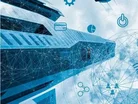Opinion: The future of the city is smart and sustainable

The march towards urbanisation is inexorable. COVID-19 may have dampened its pace temporarily, but cities continue to offer the most efficient means of organising societies, and serving up the best economic opportunities.
Yet, alongside the benefits of high density living are some very tangible externalities - congestion, transportation systems under duress, lurking security threats, proliferation of diseases and intense competition for utilities, to name a few. To address these issues, become smarter and greener, as well as enhance the overall quality of life for communities, cities around the world are rapidly adopting smart city technologies: solutions that enable societies toward a more connected, resilient and sustainable future.
Being connected
The modern world is experiencing an explosion in bandwidth, reduced latency, and network coverage at lower cost per connection node. In the last decade, the cost of Internet of Things (IoT) sensors has fallen more than three-fold, leading to more wireless sensors being retrofitted onto buildings, critical and transportation infrastructure at a rapid clip.
These sensors detect and show what’s going on in real-time. Akin to MRI scans revealing parts of the anatomy inside the body, useful insights are derived to enable predictive maintenance and reduce unplanned downtime. It leads to improved public transportation efficiency and reliability, and reduced road congestion. Automation via robotics at workplaces and facilities such as hospitals also become viable. Complexities are more readily abstracted down to simple phone applications, be it for efficient utilities management, prompts for improvement actions by city councils, or even for scheduling and payments of seamless public transport journeys.
Being resilient
The proliferation of sensors, artificial intelligence, and data measurement platforms yield new benefits for security, bringing higher levels of situational awareness to cities. Remote surveillance and crowd sourcing, combined with sensemaking help detect anomalies and enable timely intervention. Even a humble but ubiquitous lamppost can be wired up to serve as a city sentinel, helping to monitor traffic, potential threats and environmental changes. In the current pandemic situation, smart city technologies offer increased and improved options for expeditious contact tracing and enforcement of safe distancing.
Being sustainable
New combinations of connected technologies are driving greater efficiencies in utilities. Across various cities, utility systems are being retrofitted to move closer to net-zero outcomes. Intelligent power grids enable optimal injection of renewable energy. Smarter water grids reduce network leakage. On-demand lighting, air-conditioning and waste management allow the optimal matching of services and supply to human demand.
In land transportation, the need for car ownership is reducing gradually as more efficient and affordable, seamless end-to-end mass transit options are offered to commuters. Meanwhile, we have also witnessed a transformation with the rollout of shared and autonomous public transportation, facilitated by Mobility-as-a-Service applications, and a shift to electric transportation platforms, which significantly decrease traffic congestion, pollution and the carbon footprint of every passenger.
A trajectory of growth
Given these opportunities, it is not hard to see why a burgeoning spectrum of businesses, be they startups, technology giants, engineering powerhouses and real-estate developers, are all coming round and pivoting, to capture these abundant new opportunities.
ST Engineering has been in the smart city business for many years, with more than 700 projects in over 130 cities under its belt, including its contributions to Singapore’s Smart Nation efforts. However, against the backdrop of growing smart city opportunities and intensifying competition, the creation of Urban Solutions (URS) as a Global Business Area (GBA) to drive the Group’s smart city strategy and growth is timely.
In picking up the mantle as the go-to-business for the Group’s smart city initiatives, and the key account holder for cities around the world, URS will continue to help cities transform into smarter and greener spaces. Today, Urban Solutions has a good starting point with a comprehensive suite of solutions covering smart metro, intelligent road traffic management, fleet telematics, IoT and data platforms, alternative data connectivity, cloud-enabled smart buildings and estates, intelligent security systems, robotics for healthcare and even urban cooling innovations. We intend to pivot further and potentially bring forth new capabilities including digital mobility payments, electric vehicles, autonomous vehicles, intelligent energy management, and other digital offerings with a single-minded aim to move metropolises further along on their journeys to be smart cities. URS is well poised to help cities overcome key urban challenges and transform into connected, resilient and sustainable cities of the future.



